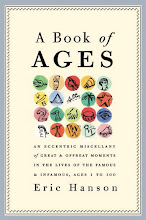On December 4th, 1783 George Washington made his famous final farewell to the band of brothers, his officers from the revolutionary army. The farewell became famous because Washington carefully organized all of his public relations. But final? Not really.
The event took place over drinks at Fraunces Tavern, around the corner from Wall Street in lower Manhattan. There's a plaque there. There are at most places Washington ate, drank or slept. The walk away from power is probably the most remarkable item in Washington's biography. Instead of using his adoring army to leverage himself in the new republic, he rode home to Mount Vernon, arriving there on Christmas Eve. He wanted to be a farmer again, or so he said, albeit a farmer whose slaves did the work.
For the past few weeks I've been reading Joseph Ellis's biography of Washington, and the man is a fascinating mixture. Honest but calculating. Wise and naive. Modern, yet bound by ancient Classical forms of behavior and honor. He freed a nation of yeoman farmers but had more in common, philosophically, with the landed aristocrats of England. At the same time he was saying goodbye to his loyal officers, he and they were organizing themselves into an elite club to rule the new nation. They called it the Society of the Cincinnati after Cincinnatus, the general who left his farm to fight for the Roman Republic, then returned to the plow after the war was won. The idea had a noble air about it, but it's motives were self-serving. For one thing, the membership wasn't just exclusive but hereditary.
Washington distanced himself from the group after Jefferson and others explained how bad it looked, even though he didn't quite understand the contradiction. How could anything he'd been involved in be dishonest or ignoble? He was always concerned about appearances, his legacy, his sacred reputation. It's why we have the marble statue today. The picture was so carefully composed it's hard to imagine a person underneath it. It's the contradictions that make him seem human today.
We think of the founding fathers (or some do) as the mythic creators of our national religion, fierce enemies of taxation and elitism. But Washington was elite and proud of it. (He envisioned his vast landholdings beyond the Allegheny being farmed by tenants, which was the European model. One scheme involved bringing in German immigrants to work his land as serfs.) He wasn't a Christian along the lines of modern fundamentalists; he was a child of the Enlightenment, speaking of Providence rather than God, a skeptical agnostic at best. He believed in a strong central government, primarily for the purposes of taxation. He'd spent the entire war feuding and fighting with a "no taxes" crowd in the Congress and the state legislatures. He'd won the war in spite of their refusal to fund the enterprise. Once he was pulled back into public life and made president, one of his most significant acts was to send an army to the frontier to put down a tax revolt. If he were our president today he would be the one sending in the black helicopters.
He presents an interesting and complex picture. I'll never look at a dollar bill the same way again. Washington appears 10 times in A Book of Ages.
Friday, December 4, 2009
Cincinnatus
Subscribe to:
Post Comments (Atom)





No comments:
Post a Comment